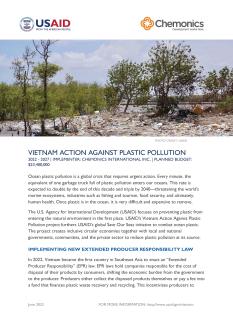2022 - 2027 | IMPLEMENTER: CHEMONICS INTERNATIONAL INC. | PLANNED BUDGET: $23,400,000
Ocean plastic pollution is a global crisis that requires urgent action. Every minute, the equivalent of one garbage truck full of plastic pollution enters our oceans. This rate is expected to double by the end of this decade and triple by 2040—threatening the world’s marine ecosystems, industries such as fishing and tourism, food security, and ultimately, human health. Once plastic is in the ocean, it is very difficult and expensive to remove.
The U.S. Agency for International Development (USAID) focuses on preventing plastic from entering the natural environment in the first place. USAID’s Vietnam Action Against Plastic Pollution project furthers USAID’s global Save Our Seas initiative to combat ocean plastic. The project creates inclusive circular economies together with local and national governments, communities, and the private sector to reduce plastic pollution at its source.
IMPLEMENTING NEW EXTENDED PRODUCER RESPONSIBILITY REGULATIONS
In 2022, Vietnam became the first country in Southeast Asia to enact “Extended Producer Responsibility” (EPR) regulations. EPR regulations hold companies responsible for the cost of disposal of their products by consumers, shifting the economic burden from the government to the producer. Producers either collect the disposed products themselves or pay a fee into a fund that finances plastic waste recovery and recycling. This incentivizes producers to design products with reduced environmental impacts.
Vietnam has set ambitious, mandatory EPR implementation deadlines, some as early as January 2024 for packaging. The project supports the Ministry of Natural Resources and Environment (MONRE) to implement the EPR law. The project also engages producers and waste processors to facilitate EPR readiness, demonstration, and scaling, particularly in plastic waste separation, collection, and recycling.
INTRODUCING EFFECTIVE SOLID WASTE MANAGEMENT MODELS
Solid waste management (SWM) encompasses the collection, sorting, transport, treatment, and disposal of solid waste. Building strong SWM systems across Vietnam requires efforts that start at the local level due to diverse informal and formal waste collection models, low levels of separation at source, mixed waste disposal, and significant variation in 3R (reduce, reuse, recycle) practices. The project provides technical assistance to provincial authorities and helps to mobilize financing to effectively plan, finance, and implement improved SWM systems. Effective SWM models will reduce plastic waste leakage and generate incentives for household waste separation. Once SWM systems are established, the project will facilitate linkages to EPR investors, private financing, and other funding mechanisms.
DEMONSTRATING SINGLE-USE PLASTIC REDUCTION MEASURES
Single use plastics (SUPs)—which constitute approximately 72% of all plastic waste in Vietnam—represent one of the country’s greatest drivers of plastic waste. Their fragments are highly prevalent in rivers and coastal locations and extremely harmful to marine life. The project works at the provincial and local levels to facilitate SUP reduction action plans, roadmaps, and collective action initiatives that target diverse stakeholders, including youth and informal sectors. Initial activities target markets, retailers, restaurants, and food service companies—where demand for SUPs such as plastic bags and utensils is high—to promote alternatives to SUPs, including simple solutions such as the sale of reusable bags.
IMPACT
The project is expected to support the development and implementation of at least 10 national and local-level policies that promote the reduction of plastic pollution and sustainable management of municipal solid waste. The project is also expected to support the piloting and scaling up of at least seven models for reducing, collecting, recycling, and disposing of waste, and at least five SUP reduction action plans at the local level.
TARGETED LOCALITIES
The project works at the national level and at the subnational level in Hanoi, Ho Chi Minh City, Can Tho, and selected coastal provinces to be identified.


